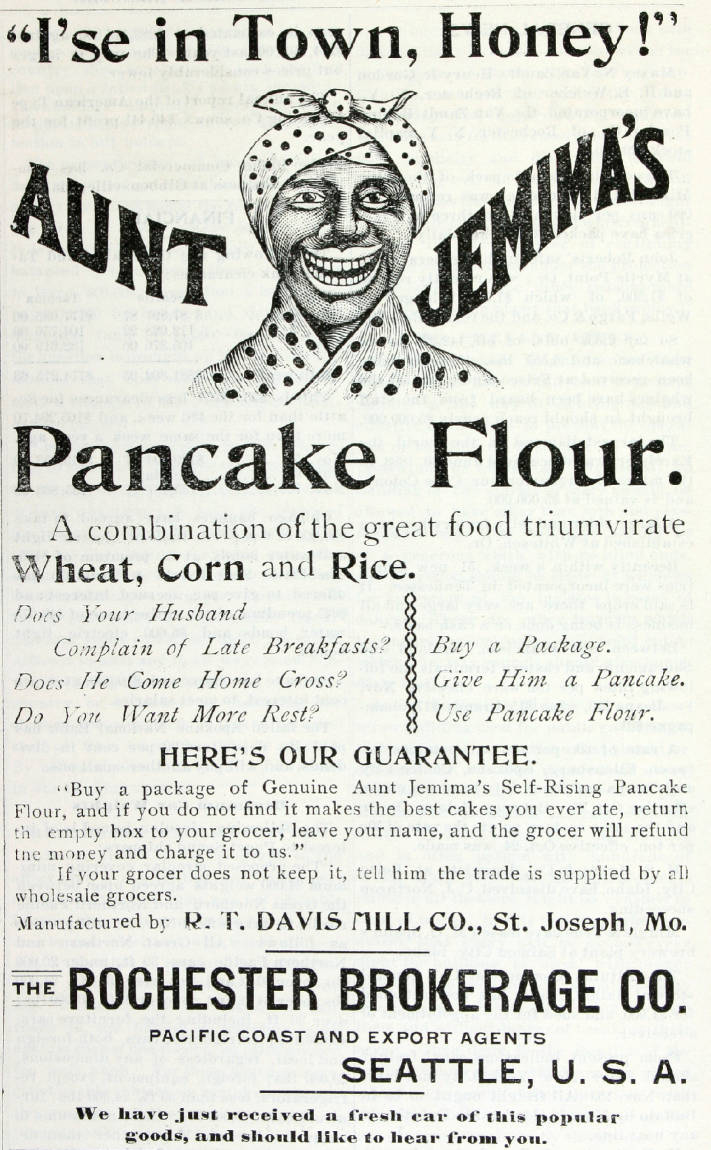Background
The Pearl Milling Company introduced ready-mixed pancake flour to American consumers in 1889. It provided all of the dry ingredients pre-mixed in a single package. Home cooks only needed to combine the dry mix with the wet ingredients to create pancake batter. This new invention made making pancakes and other recipes at home much easier and changed the way Americans thought about home cooking. Following the Pearl Milling Company’s example, many new businesses began to sell ready-mixed products in stores.
In 1893, the R.T. Davis Milling Company purchased the Pearl Milling Company and began to explore new ways to advertise and increase sales of its pancake product. This new advertising effort led to the creation of the Aunt Jemima pancake brand.
About the Image
The advertisement shows Aunt Jemima as portrayed by Nancy Green. Nancy was a formerly enslaved woman hired by the R.T. Davis Company to play the role of Aunt Jemima at events across the United States.
Advertisers based the character of Aunt Jemima on the minstrel song “Old Aunt Jemima.” White enslavers frequently called enslaved women who worked in the home “aunt.” White men in blackface typically performed the song. The white salesman who created the fictional character of Aunt Jemima rooted the character in slavery and connected white consumers’ romanticized view of the “Old South” with their easy-to-make homemade pancakes.
Aunt Jemima is also associated with the racist stereotype of the “mammy,” a Black female housekeeper. The mammy is devoted to her white enslavers and appears happy to serve them. She is depicted as loyal and kind but lacking intelligence. As the family’s nanny, the mammy was shown to lovingly raise the white children, while ignoring her own.
Quaker Oats, the current owner of the Aunt Jemima brand, announced in 2020 that they would discontinue the name and image. They acknowledged it was a racist stereotype and the brand was renamed the Pearl Milling Company.
Vocabulary
- blackface: Offensive portrayal of Black people by white people wearing black facial makeup.
- minstrel: Performance by white performers in blackface portraying Black people in a stereotypical and offensive manner.
Discussion Questions
- What does the character of Aunt Jemima represent? How does she reflect the racist attitudes of the time?
- As Aunt Jemima, Nancy Green had to portray romanticized narratives of slavery written by white men. How might Nancy’s past as an enslaved person have influenced her work experience? Why do you think she chose to take this job?
- What kind of product did the Aunt Jemima character sell? Why do you think this product was popular in this era and what does it tell you about the influence of industrialization on American food culture?
- Why did Quaker Oats decide to change the brand name? What might have influenced their decision?
Suggested Activities
- Read about the life of Nancy Green, the first woman to portray Aunt Jemima.
- Pair this resource with the life story of Mary Ellen Pleasant. How did she take advantage of the mammy stereotype? What role might the Aunt Jemima brand have played in her ability to do so?
- Examine the artwork by Betye Saar, The Liberation of Aunt Jemima. How does she use the mammy stereotype as a form of empowerment?
- Pair this resource with Ida B. Wells’s pamphlet about Jim Crow. Both Ida B. Wells and Nancy Green were present at the World’s Columbian Exposition. How did their experiences differ? To what extent were those experiences influenced by their backgrounds?
- For a larger lesson on the experiences of Black women during this time period, combine this resource with a study on Black domestic workers, images of Black incarcerated women, an article about a labor strike in Atlanta, images of Exodusters, Ida B. Wells’s pamphlet about Jim Crow, a speech from the first Black women’s club convention, and the life stories of Josephine St. Pierre Ruffin, Edmonia Lewis, Mary Ellen Pleasant, and Lucy Parsons.
Themes
AMERICAN IDENTITY AND CITIZENSHIP
New-York Historical Society Curriculum Library Connections
- Learn more about mammy stereotypes and deepen students’ understanding of this work by connecting it to the stereotype resources in the curriculum guide Black Citizenship in the Age of Jim Crow.







